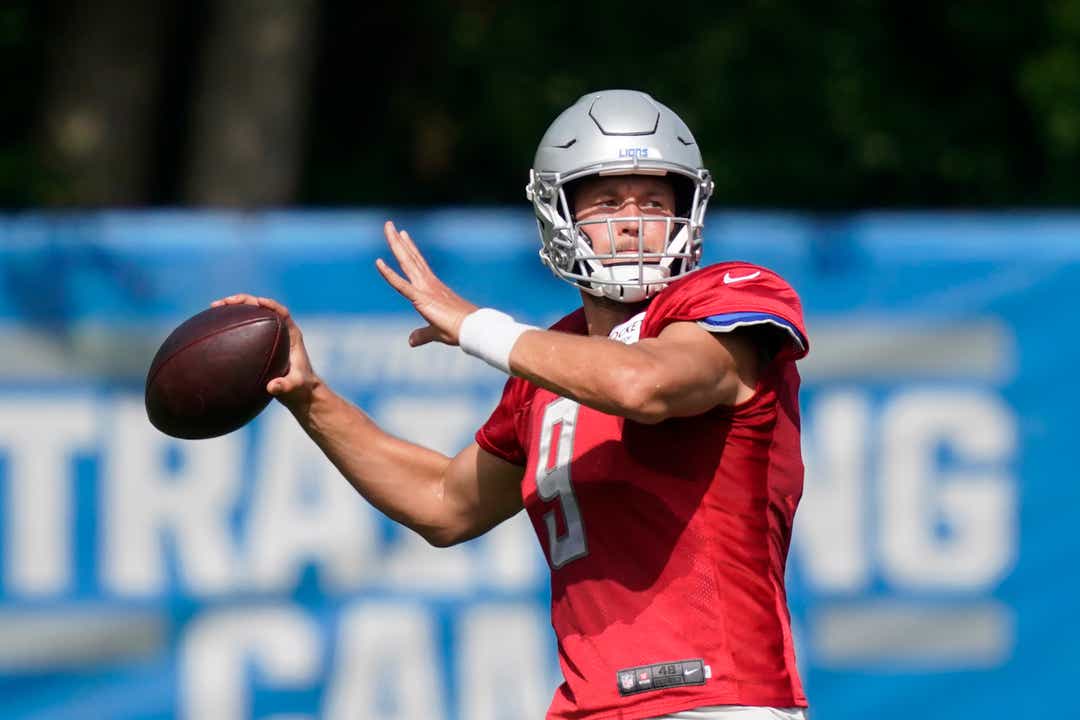Matthew Stafford has tried hard to avoid the spotlight in his 11 seasons in Detroit.
He’s not on social media, rarely makes headlines off the field (even for the good he quietly does in the community) and has mastered the art of dodging questions that are even remotely controversial.
But in the past few months, the Detroit Lions quarterback has become an unlikely ally for social justice reform, using his voice, money and platform to champion causes near and dear to him, his family and teammates.

For subscribers: Lions camp observations: Jeff Okudah gets first-team reps
The 32-year-old said Friday his new front-facing approach was born out of this year’s emotional offseason, when the coronavirus pandemic pushed football to the backburner and George Floyd’s death sparked protests across the country and spurred deep discussions in the Lions locker room.
“This offseason for us as a football team was a special one,” Stafford said. “It was different. Obviously, we’re on these Zoom calls, but there was some awesome conversations that happened. We got a lot of listening, a lot of learning and a lot of inspirational stuff, so that was an awesome thing to be a part of. Kind of got the wheels turning.”
Stafford took part in a virtual town hall for voter education last month along with teammates Trey Flowers and Duron Harmon.
During the session, he championed the importance of equal educational opportunities for children, something he has worked behind the scenes for since pledging $1 million to revitalize a Detroit rec center years ago (as part of a charitable investment with Free Press columnist Mitch Albom’s nonprofit S.A.Y. Detroit).

Looking ahead: Lions won’t have fans at Ford Field to start 2020 season
He and his wife, Kelly, made a sizable donation to a local food bank and area hospital workers at the outset of the pandemic, and last week they gave $350,000 as part of a $1.5 million donation to their alma mater, Georgia, to seed a program designed to “implement strategic initiatives in the areas of diversity, inclusion, equity and social justice” for the school’s athletes.
“Give a lot of credit to my wife,” Stafford said. “She was hugely instrumental in getting everything together as well, so total team effort. Just trying to figure out what the best way to make an impact is. We’ve done some work here in the Detroit area and wanted to do some work back where we spent our college years and obviously Georgia was starting — thinking about starting this program and we were obviously extremely happy to be a part of it.”
While B-list players have typically led the NFL’s social justice movement, Stafford is part of a growing group of stars who’ve become willing to speak out against racial and social inequities.
Kansas City Chiefs quarterback Patrick Mahomes, the game’s biggest star, was among a host of players who took part in a video asking NFL commissioner Roger Goodell to explicitly condemn racism and support silent protests like the one Colin Kaepernick waged in the 2016 season by kneeling during the playing of the national anthem. Goodell did, in a video of his own.
For subscribers: A sleeper to watch in the offensive backfield

Tampa Bay Buccaneers quarterback Tom Brady signed a letter to lawmakers demanding an end to qualified immunity for police officers, something Stafford also put his signature on.
And New Orleans Saints quarterback Drew Brees, after drawing a backlash for saying he “will never agree with anybody disrespecting the flag of the United States of America or our country” by kneeling for the anthem, donated $5 million to build health care centers in underserved Louisiana communities.
“I’m not really doing it for (attention) at all,” Stafford said. “I’m just doing it cause I think it’s the right thing to do. That’s what I believe in, what my wife believes in, what our family believes in, so we’re just trying to do what we can to make a difference. It wasn’t for anything else, it wasn’t for trying to lead QBs or anything like that. We’re just trying to figure out how we can make a difference and help people along the way and we thought this was a good start and just happy to be a part of it.”
More: Detroit Lions’ Tracy Walker to wear Ahmaud Arbery’s name on helmet
Stafford said there was not one moment during the Lions’ spring Zoom sessions that brought him to this point, but rather “a bunch.”
“It was a bunch of conversations, a bunch of stories, a bunch of perspectives from a bunch of different people,” he said. “A ton of perspective gained, a ton of knowledge, a bunch of respect for people and just trying to figure out what we can do to help and that’s kind of where we started. And like I said, (this is) a start and just trying to do a little bit of something, a little bit of good and help out.”

Stafford would not say Friday if he will kneel for the anthem this season, echoing comments by Lions coach Matt Patricia that the decision will be made as a team.
Kelly Stafford apologized on Instagram last week for comments she made three years ago condemning players who take a knee.
“I’m happy to do whatever I can to help support our guys and whatever we want to do, that’s something that’s not — hasn’t really been brought up, hasn’t been finalized as of yet.” Stafford said. “We’re talking ball right now, trying to figure out how we’re going to beat man coverage and how we’re going to stop people and all that. So that’s kind of what we’re working on right now.”
Contact Dave Birkett at dbirkett@freepress.com. Follow him on Twitter @davebirkett. The Free Press has started a new digital subscription model. Here’s how you can gain access to our most exclusive Lions content.